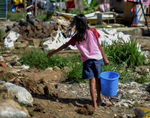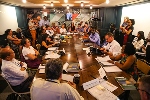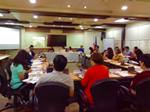Philippines
Published on Mon, 2019-07-01 00:00
 |
The upcoming 2019 High-Level Political Forum (HLPF) in July in New York with the theme, “Empowering people and ensuring inclusiveness and equality,” spurred Social Watch Philippines (SWP) and other organizations like the Global Call to Action against Poverty (GCAP), Save the Children, Philippine Alliance of Human Rights Advocates (PAHRA), Institute for Social Entrepreneurship in Asia (ISEA), Plan International, Philippine Social Enterprise Network (PhilSen), Tebtebba, Voice of the Free, and Fair Trade Alliance among others, to organize a broader CSO consultation workshop to catalyze a process for civil society organizations (CSO) from different sectors towards engaging the Philippine government on the Voluntary National Review (VNR). With the support from United Nations Development Programme (UNDP), Save the Children Philippines and Philippine Alliance of Human Rights Advocates (PAHRA), a consultation workshop Towards Coherent Policies for Sustainable Development Goals (SDGs) in the Philippines: Civil Society Organizations (CSO) Inputs to the Voluntary National Review (VNR) was held on February 7 to 8, 2019 in Quezon City, Philippines participated by around 70 representatives of different civil society organizations.
|
Published on Tue, 2019-05-28 09:11
The Philippine Congress, particularly the Senate, has a handful of days left to pass important legislation. One of the urgent bills that the Senate should pass is the increase in the tobacco tax rate.
The Executive has strongly endorsed the bill of Senator Manny Pacquiao and has even certified its urgency. Pacquiao’s bill proposes a tax rate of P60 (against the current rate of P35). Subsequently, the rate increases by 9% annually to keep cigarettes less affordable in light of rising income and inflation. Senators Sherwin Gatchalian and JV Ejercito have bills that introduce higher rates — P70 and P90, respectively.
|
Published on Fri, 2019-03-15 12:23
Under the motto "Imagining Gani", Social Watch Philippines gave tribute last March 11 to Isagani Serrano, who passed away last February 22nd. Gani was a Co-Convenor of Social Watch Philippines and a contributor to the national Social Watch reports for several years. He was president of the Philippine Rural Reconstruction Movement (PRRM) and author of numerous papers and reports on climate and social justice.
Roberto Bissio, from the international secretariat of Social Watch, contributed a personal testimony: "Guiding Gani through Montevideo at his first visit to my hometown was not an easy a task, as his curiosity was insatiable. He definitely had to visit the places where tango was born, and impressed me with his knowledge of the songs and biography of the legendary singer Carlos Gardel. And he insisted on visiting the old jail of Punta Carretas, then already transformed into a shopping center, out of which over a hundred political prisoners escaped in the early seventies through a tunnel. "That episode costed me six months of solitary confinement" remembered Gani to my surprise. In those times Gani was a prisoner himself in the Philippines "and when we heard the news of the tupamaros escaping, we started digging ourselves... but got caught!"
|
Published on Mon, 2019-02-25 11:57
Gani passed away last February 22nd. Gani was a Co-Convenor of Social Watch Philippines and a contributor to the national Social Watch reports for several years. As a president of the Philippine Rural Reconstruction Movement (PRRM), visit http://www.prrm.org/isagani-r-serrano.html.
|
Published on Wed, 2019-01-23 16:05
In the Philippines, with a huge mandate to back it up, the government of President Rodrigo Duterte (locally referred to as “DU30”) set off on a long-term goal consistent with the 2030 Agenda, promising to end poverty by 2040 and building a more fair, prosperous, stable and peaceful society through inclusive economic growth that minds environmental limits.
Two years down the road, Isagani Serrano, president of the Philippines Rural Reconstruction Movement and a convener of Social Watch Philippines, reports that “DU30 appears on track with its 7-8 percent annual economic growth target because of a massive ‘build, build, build' infrastructure programme accounting for 5.4 percent of GDP in 2017. The negative impact of this programme, specifically conversion to other land uses of already diminishing farmlands, is still to be determined. But the fossil fuel- intensive infrastructure and power programmes and projects could reverse modest gains achieved in environmental protection and rehabilitation.”
|
Published on Mon, 2018-07-16 00:00
The experience of Voluntary National Reviews and of Civil Society shadow (or spotlight) reporting.
How it is key for meaningful participation and accountability
The side event "SDG Implementation at National Level: What’s the Point of National Reports?" was held on July 17 in New York, during the meeting of the High Level Political Forum of the UN. The debate focused on voluntary national reports (VNRs) and parallel “shadow” or “spotlight” reports generated by civil society organizations (CSOs) on progress towards the Sustainable Development Goals (SDGs).
|
Published on Thu, 2017-04-27 15:53
“The universal and potentially 'transformative' character of the USPF has broad appeal to many rights-based advocates", explained Victoria Raquiza, convenor of Social Watch Philippines at the start of a debate convened by SWP and UNICEF in Manila, last April 26. “While acknowledging the strides made in social protection such as through the conditional cash transfer program (Pantawid Pamilya), PhilHealth and pensions for the elderly, social protection remains fragmented, inaccessible and unreachable to many Filipinos."
Speakers from the governmental Department of Social Welfare and Development, National Anti-Poverty Commission, and the Coalition of Services of the Elderly reacted to the propositions of UNIEF, the ILO and Social Watch Philippines.
|
Published on Wed, 2016-10-05 09:41

Photo: A girl makes her way home
after fetching water at a coastal
village in Tacloban, Leyte province.
Photograph: Ezra Acayan/NurPhoto
/Rex
|
Three years after the typhoon destroyed more than a million homes and killed 6,000 people, the Philippines has fallen far short on house-building pledge.
When Typhoon Haiyan smashed into the city of Tacloban in the central Philippines almost three years ago, Arsenio was one of the lucky ones – he survived by swimming a kilometre to safety. “Every time there is a storm, I get scared, even after three years,” he said. “I don’t want to go through the same thing again.”
|
|
Source: 
. Published on Mon, 2016-10-03 00:00
Three years after the typhoon destroyed more than a million homes and killed 6,000 people, the Philippines has fallen far short on house-building pledge.
|
Published on Mon, 2016-07-18 00:00

Prof. Leonor Briones
|
Much is made of the public-private partnership (PPP). This is where the public and private sectors combine to produce outcomes which are favorable to the nation. In practice, this has meant Luzon-based transportation infrastructure projects. Visayas and Mindanao have been largely left out. President Duterte will change this. Which is partly why a whopping 62 percent of Mindanaoans voted for him. In a presidential contest where there were four highly supported candidates, this is a remarkable mandate.
|
SUSCRIBE TO OUR NEWSLETTER
Submit

|











